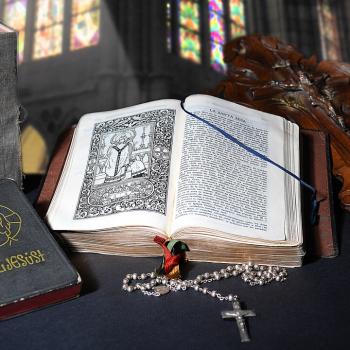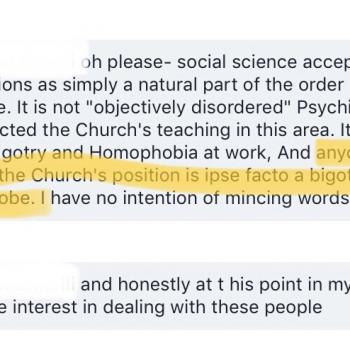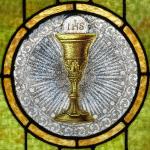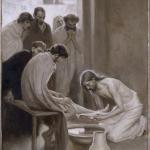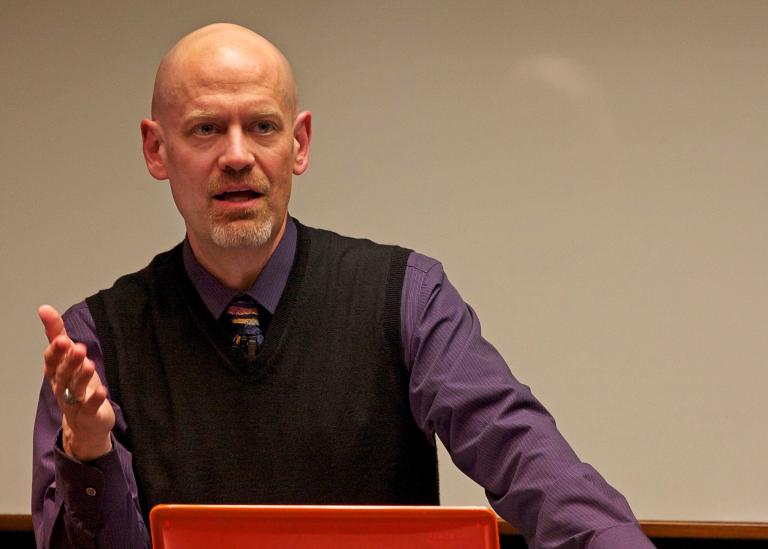
Once upon a Tuesday night in May—’twas in the halcyon days when there were yet no more than a mere 48,503 Protestant sects—Dr.* James Robert White (Th.D., D.Min., etc., etc.), of Alpha & Omega Sophistries, ensconced in the red and scarred Phoenix desert of mirrors crack’d from side to side and shorn in scores, was soon to have his blithe and self-illusions disrupted by the following missive from myself, alerting him to the existence of this blog post:
@DrOakley1689 correct that there is only one gospel. There is also only one Church, not 48,500: http://t.co/KnTmMYcbqT
— Scott Eric Alt (@ScottEricAlt) May 15, 2013
To which missive, via virtual camel carrier, and nomad in tow, and a dust of sand, the good Reformed Baptist elder, apologist, and doctoral recipient (as he saith) replied, thus:
@scottericalt Your number is so absurd it destroys any credibility on your part. Stop promoting such silliness.
— James White (@DrOakley1689) May 15, 2013
Horrors. I rend my robes to think of it. The last thing I would want is for a Catholic apologist to lose his credibility in the estimation of a Reformed apologist (especially one as studied, and traveled, and burnished and polished and glossed with credentials, as the good Dr.* White (Th.D., D.Min., etc., etc.). That never happens. I would be the first in the long history of the Church.
Not satisfied with tweeting such dire warnings to “stop!” however, the aforesaid good Reformed Baptist elder, apologist, and doctoral recipient (as he saith) continued, thus:
@scottericalt aomin.org/aoblog/index.p… Fully documented. I await your response.
— James White (@DrOakley1689) May 15, 2013
Well, since you asked, Dr.* White. I would be glad to help you sort through your documentation issues. This is as free a service as you shall come by from here to eternity, from camel to Western Union to cybermissive.
The Deceitful Ways of Mr. Ray
The blog article to which, in kindly helpfulness, the good Reformed Baptist elder, apologist, and doctoral recipient (as he saith), pinnacle of credibility and non-silliness, man of letters, marvel of light and reason, etc., etc., directed me, was one with which I am, of course, familiar. To spare the reader the pain and tedium of reading it (and the pain is diabolic, that let me tell you), I will reveal that said blog article is devoted to exposing the “temerity”—yea, the downright mendacity!—of Steve Ray in promoting the figure of 33,000 sects. (Which figure Mr. Ray obtained from the 2001 World Christian Encyclopedia, a known promoter of fabrications, lies, prevarications, falsehoods, Canerisms, etc., etc.)
According to Dr.* White, however, that encyclopedic figure has “no meaning to any serious-minded individual.” (Dr.* White being, as it were by self-promotion, the blogosphere’s arbiter of serious-mindedness. Twitter’s too. Dr.* White has cornered the market for seriousness in the New Media.) Mr. Ray is “willing to throw his integrity under the bus,” saith Dr.* White (Th.D., D.Min., etc., etc.), who attributes such a shocking level of deceit to “the way of the Catholic Convert.” Mr. Ray is more than mere man, you see; he is an archetype of moral disrepair existing in the anti-Catholic imagination.
Thus is it any wonder that, when I would posit 48,500 as the credible product and sum of twelve years of sectarian increase, Dr.* White (Th.D., D.Min., etc., etc.) would proclaim me “absurd” and lacking in the seriousness that he himself is well known for? Heavens, first Dr.* White compares me to Jason Stellman, and now to Steve Ray! And here I am, who have been blogging for less than half a year. If I keep going at this same dangerous and folly-ridden rate, soon I’ll be on a par with the wickedness of Mr. Armstrong, Mr. Staples, Fr. Stravinskis, Mr. Sungenis, dare I even hope Mr. Keating or Dr. Cross or Dr. Hahn?
But let me satisfy Dr.* White’s serious-minded curiosity about the nature of my response (which he appears to “await”). Let us at the outset peer into the heart of the good Reformed Baptist elder, apologist, and doctoral recipient’s critique of the temerarious Steve Ray. Saith Dr.* White (Th.D., D.Min, etc., etc.):
This source [i.e., the World Christian Encyclopedia] lists 8,973 “[sects]” under “Protestant.”
[Note the scare quotes to imply definitional doubt about sect and Protestant. This is what is known as poisoning the well.]
So what does [Steve Ray] do when he has all along been claming the 33,000 number represents Protestants derived from the Reformation due to sola scriptura? What does he do? [Your guess is as good as mine, dear reader, why Dr.* White, in eager, breathless fashion, asks that question twice.] Well, he takes the Protestant category, lumps the “Independents” in as “Protestants” (including Mormons, Jehovah’s Witnesses, Gnostics, Bogomils, and even Swedenborgianists!), then, so desperate is the man, he then [Then he then?] grabs such groups as “Arab radio/TV network” (19 [sects] worth!) and “Japanese Oneness Pentecostal” (14 [sects] worth) to help pad his numbers!
You can almost hear the victorious Dr.* White (Th.D., D.Min., etc., etc.) cry, with vindication and mirth and confetti, See! Why, look you now! there aren’t 33,000 Protestant sects—nowhere close. According to Mr. Ray’s very source, there are only just less than 9000. Protestantism is as good as gold. It doesn’t have a sect problem at all. Not at all, no sir! Mr. Ray does not want you to think about that one! Ha-ha!
As many times as Dr.* White (Th.D., D.Min, etc., etc.) has addressed the subject of how many Protestant sects there are, this is the heart of his matter: The World Christian Encyclopedia does not say 33,000. That figure can only be derived by searching about, in duplicitous and desperate fashion (like the evil Mr. Ray did), for additional numbers to dubiously and deceitfully and disreputably add to the microscopic and non-scandalous 9000. I mean, talk about lies and the lying liars who tell them!
What Does the Encyclopedia Really Say?
But is that in truth what has happened? For in the following passage from the Encyclopedia (about which the thorough Dr.* White says naughts and crosses), we may read the following:
A [sect] is defined in this Encyclopedia as an organized aggregate of worship centers or congregations of similar ecclesiastical tradition within a specific country … whose component congregations and members are called by the same [sectarian] name in different areas, regarding themselves as one autonomous Christian church distinct from other [sects], churches[,] and traditions.
[In other words, as long as they regard themselves to be ecclesiastically autonomous, they’re a sect.]
As defined here, world Christianity consists of 6 major ecclesiastico-cultural blocs, divided into 300 major ecclesiastical traditions, composed of over 33,000 distinct [sects] in 238 countries (Vol. I, p. 16).
Well, golly. Imagine that. Turns out, the 33,000 figure does not come from any shenanigans of addition engaged in by that shrewd and knavish sprite called Steven K. Ray. (As though Mr. Ray had been deliriously combing through the pages of the Encyclopedia, shrieking, “Where can I find more? Where can I find more?”) It actually comes from the editors of the Encyclopedia itself. But you’ll search in vain through Dr.* White’s attempted evisceration of Mr. Ray for any mention of that. Naughts and crosses.
The Encyclopedia divides that number thus:
Independents, ca. 22,000
Protestants, ca. 9000
Marginals, ca. 1600,
Orthodox, 781
Roman Catholics, 242
Anglicans, 168
Totaled, this gives us a number of about 33,791. Removing “Orthodox” and “Roman Catholic” from the list (did you catch that, Dr.* White?), we are left with a total of 32,768. And what do you know? That is the exact number I came up with, in my previous article, as the number of Protestant sects at the end of 1997, given the premise that the number of sects has doubled every 32 years since 1517. Shazaam!
Of course, Dr.* White (Th.D., D.Min, etc., etc.) does seem to have a point when he says that only 9000 of these sects are grouped by the Encyclopedia as Protestant. The very helpful Phil Porvaznik, however, explains why in justice “Independents” (and the others) can be included. (I’ll give you a hint: Have you ever heard of an Independent Baptist? Would you consider them anything other than Protestant?). Says Mr. Porvaznik [his bolding]:
[I]f you look at the names of these “Independent” groups … you’ll see most of them are clearly Protestant (the “Apostolic,” the “Charismatic,” the “Full Gospel,” the house or home churches, the pentecostals, probably all the TV/radio Christians, and all the Anglicans, and schismatic Catholics among the “Independents.”
He goes on; but as you can see, the difference here is not between honesty and dishonesty with numbers, or honesty and dishonesty with a source (as Dr.* White likes to pretend). The difference is in definitions. That is why Mr. Porvaznik can include “schismatic Catholics” as Protestants. An admittedly anecdotal example, but it has bearing: I oft have heard fellow Catholics refer to sedevacantists as Protestant. The reason we say that is because sedevacantists exhibit a trait that we think of as quintessentially Protestant: the rejection of the singular authority of the Church in favor of the authority of oneself. At bottom, private judgment is more Protestant than sola scriptura is. Sedevacantists call themselves Catholic, but that’s self-deceit: They’re Protestant.
I know that Dr.* White will protest—because he’s a protestant, and I’ve heard him do so—that, no, we do have the authority of Scripture, and we have the lesser (fallible) authority of, for example, the 1689 London Baptist Confession of Faith, or Calvin’s Institutes. But in saying this, Dr.* White (Th.D., D.Min., etc., etc.) is only making my point for me. In the end, he accepts those fallible authorities because he has chosen to accept them, not by any mandate of God. And he accepts the Scripture only insofar as his own fallible intellect leads him to interpret its meaning. He’s driving down a road without lanes, and that is when you get into wrecks. When you peel away the layers of excuse, you’ll discover that the Protestant, at the end of the day, submits only to the authority of his own intellect.
To assume that someone isn’t Protestant because he does not call himself Protestant, or because one Encyclopedia’s editor does not classify him thus, is to fall victim to the error of nominalism. For nominalism cuts both ways: However much someone calls himself a Christian, he may not be; however much someone denies he’s a Protestant, he may indeed be.
If Dr.* White (Th.D., D.Min., etc., etc.) wants to argue this point, he should do so with the understanding that what we’re talking about are differences in how we define terms. It has nothing to do with one side being honest with the source material and the other being dishonest. Dr.* White should stop pretending otherwise, and he should stop pretending to find absurdity or falsehood lurking within the wicked heart of every convert to the Catholic Church.
A Modest Proposal: The Formula of Original Sin
Accepting as given the figure of ca. 33,000 for 2001, I have searched, for some time now, for a scientifically accurate formula for determining the exact number of Protestant sects on any given day in history from 1517 forward. The Encyclopedia—any encyclopedia—can only give estimates; but what the Catholic apologist should desire is precision. That way, when confronted by a rabid Protestant, he can be dealing in scientific fact, not disputable conjecture. I gave the beginnings of such a model in my previous article. How do my estimates fare in comparison to other estimates from other published sources?
Well, the Encyclopedia above cited gives a figure, at the start of 2001, of 33,000. My model gives a figure of 35,840.
Back in 1980, David Barrett, the editor of the Encyclopedia, had reached an estimate of 20,800. Using my model, I would arrive at a figure of 24,064 for that year.
By 1985, according to the Encyclopedia of Christianity, Barrett had increased his estimate to 22,190. My model returns a figure of 26,624 for that year.
In 1989, the United Nations gave an estimate of “more than” 23,000 sects. My model returns a figure of 28,672.
(H/T to the valuable Dave Armstrong for these citations.)
These are fairly close matches. It is my belief, however, that my scientific model returns the more accurate figure, since it’s based upon the Law of Exponential Growth, rather than the subjective and flawed process of scouring the earth and counting sectarian heads. Using the process I described in my previous blog article, I labored hard and long to come up with a single mathematical and scientifically precise formula for a calculation of Protestant sects on any given date.
It has been my labor under the sun.
Here it is:
Let y = the previous year
Let j = the Julian date of the current year
Let z = 366 if the current year is a leap year; otherwise, 365.
First, solve for x, thus:
x = (y – 1517) / 32
Disregard any remainder.
Then, to determine the current number of Protestant sects, solve for n thus:
n = 2^x + { [ y – (1517 + 32x) ] * [ 2^x / 32 ] } + { [ ( 2^x / 32 ) / z ] * j }
With this formula, you can determine the exact number of Protestant sects on any given date in history, past or future.
For example, if you wanted to know how many Protestant sects there were on November 5, 1955, you could find out. You’d plug in the numbers thus:
x = (1954 – 1517) / 32, or 13.65625.
Disregarding the remainder, that gives us a value of x = 13.
Then we’d solve for n:
n = 2^13 + { [ 1954 – (1517 + 32*13) ] * [ 2^13 / 32 ] } + { [ ( 2^13 / 32 ) / 365 ] * 309 }
Work out that entire calculation, and you will discover that the total number of Protestant sects on November 5, 1955, was 13,784.
And, if you want to know how many Protestant sects there will be on October 31, 2017, the date when we will celebrate 500 glorious years of apostasy, you’ll be pleased to know that you can figure that out as well. On that glorious day, the rebellion of Martin Luther will have birthed as many as 53,075 sects.
The problem is, one day this kind of growth will be unsustainable. Come 2517, the 1000th anniversary of the Protestant Deformation, there will be 2.7 billion Protestant sects, unless the merciful hand of God spare the world such evil. There will come a day when Protestants will either cry uncle and come back home, or they will be destroyed by this exponential and cancerous cell division in the body of Christ.
I submit that the formula given above is more than a mathematical calculation. It expresses, at bottom, the core rebellion, at the heart of man’s existence, against the purposes of God. It is the formula written within original sin.
But Seriously
Dave Armstrong makes a serious case in his article (linked to above) that Catholic apologists make a mistake when insisting too firmly upon a specific number. Exaggeration and hyperbole, and even saire, have their purposes. But ultimately it is problematic, according to Mr. Armstrong, when one gets into “wrongheaded definitions concerning [sects].”
Mr. Armstrong and I might disagree about that. But he is right when he underscores the point of the discussion about sectarianism, whatever number you settle on at the end of the day.
Protestant apologists like [Eric] Svendsen and [James] White … have a huge problem trying to biblically justify … sectarianism and in determining the internal causes of same [such as sola scriptura, private judgment, anti-sacerdotalism, and so forth. … These problems the Protestant apologist has] by no means ever resolved or even squarely faced.
That is spot on. Dr.* White (Th.D., D.Min., etc., etc.) seems to walk through life with the assumption that, if he can just get the number of sects low enough, he can sleep the sleep of the just. Contrariwise, some Catholic apologists seem to feel that the higher the number, the greater the case against Protestantism they have.
But the fact is, St. Paul says that there is one Church. Does it really matter whether there are 48,500 sects, or 9000, or two? There is one Church. The Scriptures continually warn us against any division in the body of Christ. This is not to suggest that we should warm to any heresy under the sun for the sake of unity. But it is to suggest that the Protestant apologist perhaps should consider the possibility that God, being of infinite knowledge, knows the self-deceit that lives in the heart of man, and has set up a safeguard to keep the body of Christ unified in one judgment. That safeguard is infallibility.
Is that really so difficult to consider?
***
If you like the content on this blog, your generous gift to the author helps to keep it active. I remember all my supporters in my Mass intentions each week.







